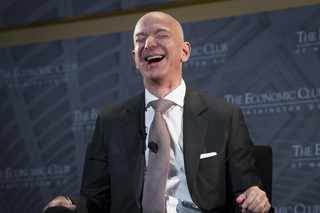Today, a handful of tech firms wield troubling influence over our political and economic institutions. Platforms like Facebook and Twitter have consolidated a major share of the public forum, selling speech, attention, and political influence to the highest bidders. Billionaires like Peter Thiel and Joe Ricketts show contempt for the free press, undermining labor conditions and vaporizing media companies that dare to challenge private power. And Jeff Bezos, the richest man in recent history and owner of the Washington Post, spent this year leading local governments down a path of self-abasement, competing to see who could offer the most to Amazon as home to its second headquarters, only to settle on the two of the most obvious choices—New York City and the Washington, D.C. area. “I'll change my name to Amazon Cuomo if that's what it takes,” said New York Governor Andrew Cuomo, revealing a pathetic eagerness to bend his office to the whims of capital. As it turned out, he went even further, offering the company billions in tax incentives along with publicly funded infrastructure.
Preparing a response to the alarming growth of tech monopolists is an urgent task for the left, and a new book by Columbia Law professor Tim Wu, The Curse of Bigness, points to a possible solution. Wu is among the country's most influential technology critics and a frequent opponent of concentrated power. His perspective draws from a wide range of experiences. He spent the dot-com bubble between the Department of Justice and Silicon Valley, later joining academia, advising the Obama-era Federal Trade Commission, and running for lieutenant governor in New York alongside Zephyr Teachout. He's best known for coining the term “network neutrality.” His previous books, The Master Switch and The Attention Merchants, examine the lifecycle of information systems and the drive to monetize human attention.
Read Full Article »



